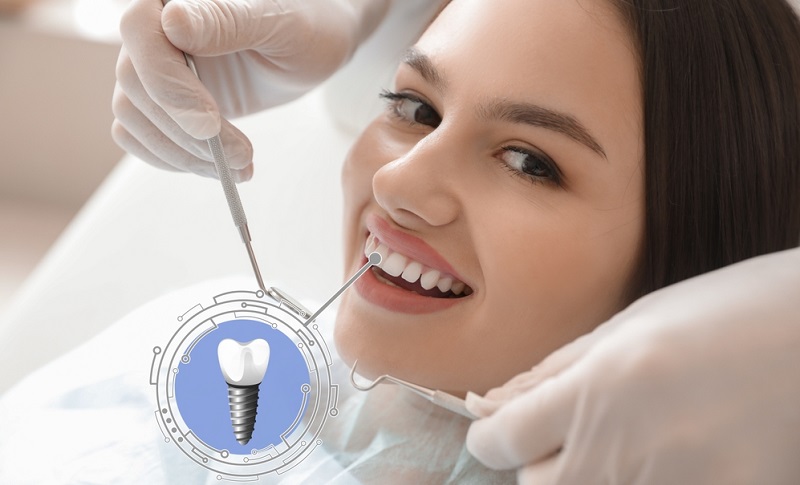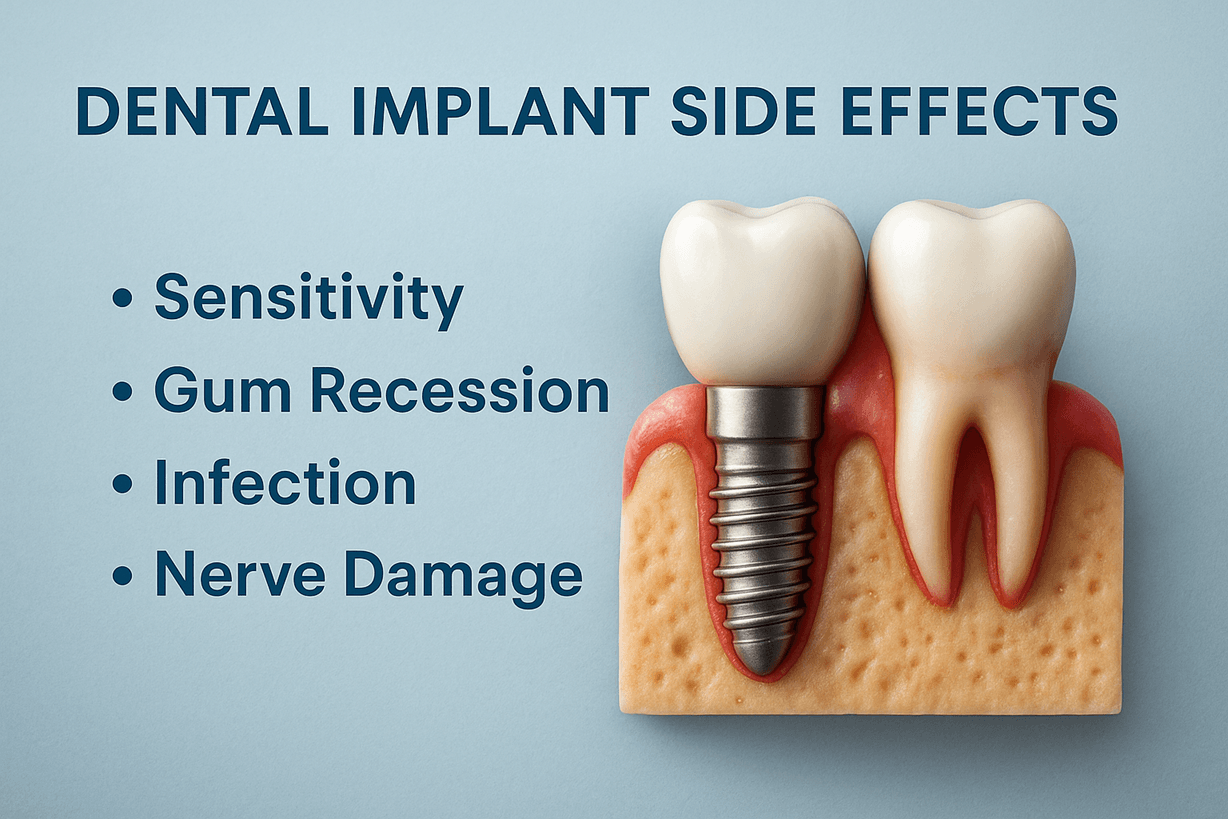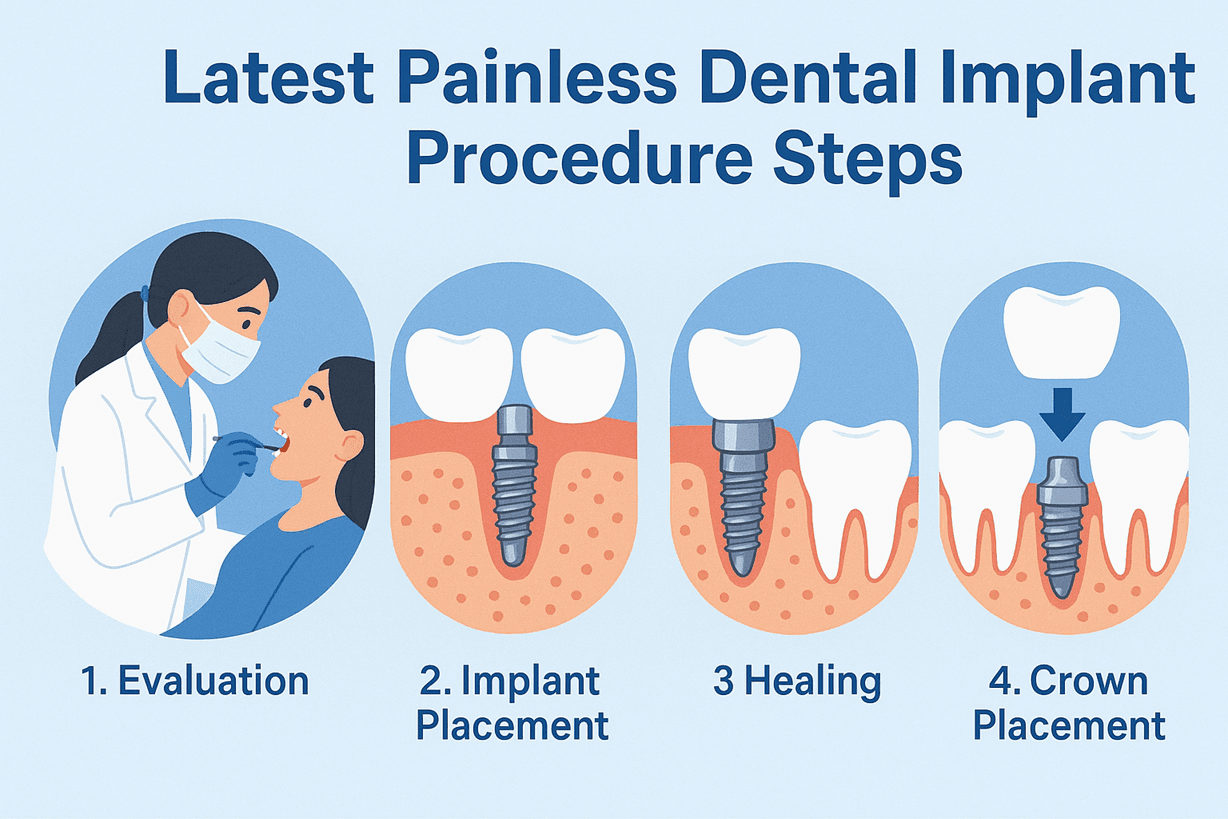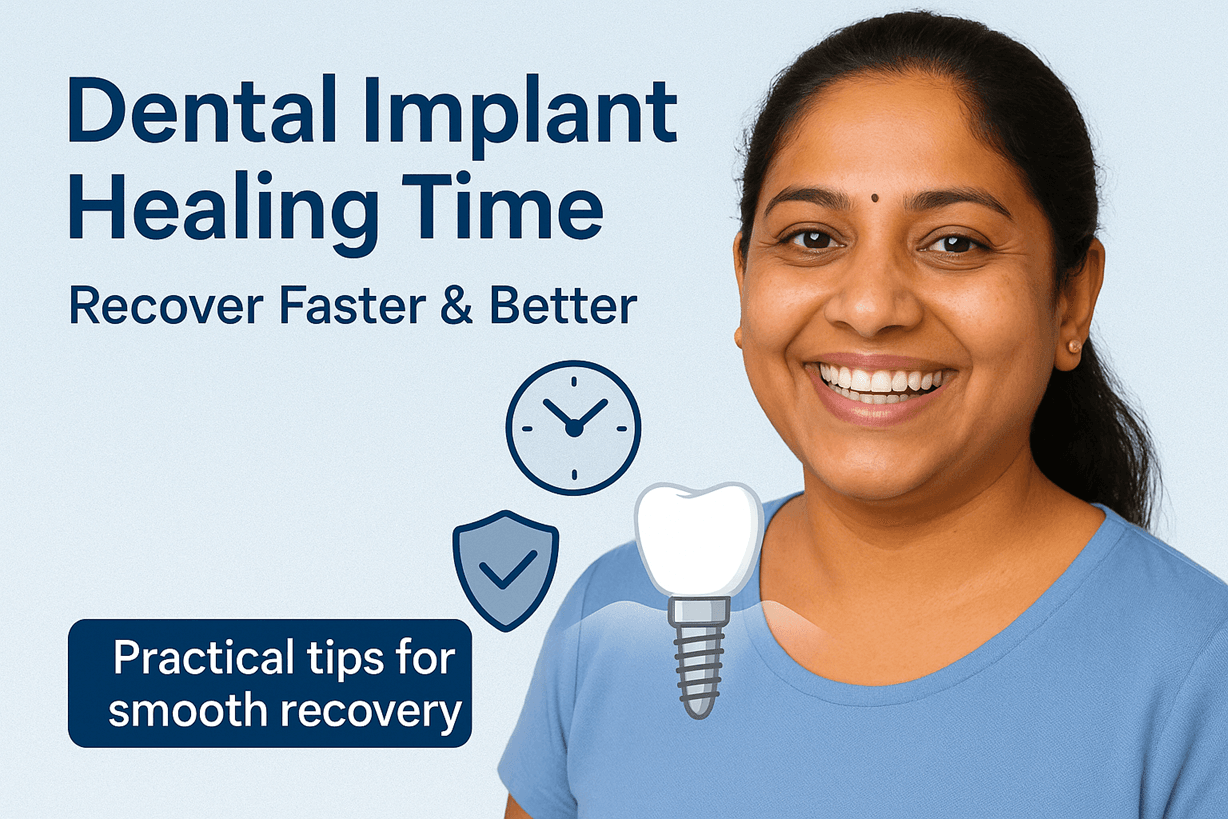Contents
- What are Titanium Dental Implants?
- The Process of Installing Titanium Dental Implants
- Tips for Proper Care After Implant Surgery
- How to Clean and Maintain the Titanium Screws on your Implants?
- What Makes Titanium Uniquely Suitable for Dental Implants?
- Advantages of Titanium Over Other Metal Alloys
- Disadvantages of Titanium Implants
- Common Issues With Titanium Screws
- Alternatives to Titanium Implants

If you are missing a tooth, your dentist has most likely recommended dental implants as the best solution.
Titanium is the material of choice for dentists globally when it comes to dental implants.
But how come this is the case? In this blog, we'll look at what makes titanium dental implants unique and why they're considered the gold standard in modern dentistry.
So strap in and get ready to learn about one of the most exciting advances in dental healthcare!
What are Titanium Dental Implants?
A titanium screw is used to secure a dental implant. The screw is put into the jawbone and connects to the implant, which is typically made of titanium.
The screw serves to maintain the implant in place while also providing stability.
Dentists favour titanium dental implants because they are robust and long-lasting. Titanium, unlike other materials, is not prone to corrosion or wear and tear.
This makes it an excellent material for dental implants, which must endure chewing and biting forces.
Furthermore, titanium is non-toxic and biocompatible, which means there is no chance of rejection or allergic reaction.
The Process of Installing Titanium Dental Implants
Making an incision in the gum tissue is the first step in putting titanium dental implants.
This reveals the underlying bone. The Implant is then implanted when a hole is bored into the bone.
An abutment (a little connecting piece) is placed on the implant once it is in place.
The gum tissue is then sutured shut. The entire procedure normally takes around an hour.
Tips for Proper Care After Implant Surgery
It is critical to care for your dental implant screw after surgery to maintain optimal healing.
Here are some pointers:
Here are some tips:
1. Maintain a clean surgical area. Brush your teeth and implant screw gently twice a day with a soft toothbrush, and floss carefully around the implant screw.
2. Avoid eating anything hard or crunchy that could damage the implant screw. Food should be cut into small pieces and chewed slowly and carefully.
3. Avoid smoking or using tobacco products, since they might slow recovery and increase infection risk.
4. Use caution when brushing and flossing around the implant screw to avoid damaging it. Take it easy!
If you experience any pain or discomfort, please contact your dentist as soon as possible.
How to Clean and Maintain the Titanium Screws on Your Implants?
There are a few key tips you can follow to keep your dental implants clean and healthy, just like with everything else.
Following these guidelines can help you get the most out of your implant and extend its life.
- Brush your teeth and implant with a soft toothbrush and fluoride toothpaste twice a day.
- Floss around the implant and between your teeth daily.
- Clean between the implant and the gum line using a water flosser.
- Biting down hard items such as ice, nutshells, or pencils should be avoided.
- Visit your dentist regularly for checkups and cleanings.
After eating or drinking anything other than water, rinse your mouth with hydrogen peroxide or mouthwash. If you have recently had your implants installed, avoid using mouthwash.
What Makes Titanium Uniquely Suitable for Dental Implants?
For a variety of reasons, titanium is an excellent material for dental implants.
- For starters, it is powerful and long-lasting, making it suited for long-term use.
- Second, it is biocompatible, which means that it is not rejected by the body and hence safe to use in the mouth.
- Third, titanium has a high success rate, with titanium dental implants having a success rate of over 95%.
- Finally, titanium is inexpensive and widely available, making it a favourite choice among dentists.
Advantages of Titanium Over Other Metal Alloys
The majority of dental implants are made of titanium. Titanium is a non-allergenic metal that is also biocompatible, which means that the immune system does not recognise it as a foreign invader and so does not attack it.
Titanium has long been used in medical equipment such as heart valves, artificial hips, and bone screws, in addition to implants.
The benefits of employing titanium in dental implants are numerous, and they include:
• Possibility of ossification
Titanium fuses with bone tissue in a process known as osseointegration, which means it becomes a part of the bone.
• Both strong and light
Titanium is incredibly strong but lighter than even gold alloys, making it ideal for individuals who require a solid and pleasant tooth replacement.
• Insufficient thermal conductivity
This decreases the chance of pain or irritation caused by sudden temperature changes.
Titanium dental implants have a remarkable success rate of 95%. The majority of dental implants can be left in place for the rest of a patient's life.
Individual or multiple implants can be utilised to support crowns, bridges, or dentures for stable, long-lasting, and aesthetically pleasing tooth repair.
Disadvantages of Titanium Implants
There are a few drawbacks of titanium dental implants that you should be aware of. One disadvantage is that they are slightly more expensive than other kinds of dental implants.
Another disadvantage is that they necessitate a lengthier healing period - typically six months - before the implant can be used to support a tooth repair.
Finally, persons who are allergic to titanium may be unable to tolerate this sort of implant.
Common Issues With Titanium Screws
It is fairly uncommon for people to have problems with their titanium screws after receiving dental implants. The following are the most typical issues:
1. Screw Loosening:
This can be caused by a variety of factors, including faulty installation and consuming hard meals. If your screw becomes loose, you should visit your dentist so that it can be tightened or replaced.
2. Infection:
One of the most dangerous risks is an infection near the implant site. This can result in pain, oedema, and ultimately implant loss. Keep the area clean and consult your dentist if you notice any signs of infection.
3. Harm to Neighbouring Teeth:
If the implant screw is not properly installed, it might cause harm to the next teeth. This is why it is critical to have your implants placed by a knowledgeable dentist.
4. Allergic reactions: Some people are allergic to titanium, which can result in inflammation and other complications at the implant site. If you suspect you are allergic to titanium, consult your dentist about other materials for your implants.
Alternatives to Titanium Implants
Several alternatives to titanium implants are available on the market today.
While each option has its own set of advantages and disadvantages, titanium implants have become the preferred choice among dentists for several reasons.
1. Zirconia Implants
Zirconia Implants are one alternative to titanium implants. Zirconia is a white, ceramic material that can be used to create very natural-looking dental implants.
Because of their colour, zirconia implants are less likely to show through the gums than titanium implants.
Additionally, zirconia is a very strong material, making it ideal for patients who have had previous dental work or who have other health conditions that may weaken their jawbone.
However, one downside to zirconia implants is that they are not as widely available as titanium implants and can be more expensive.
2. PEEK (polyetheretherketone) Implants
Another alternative to titanium implants is PEEK (polyetheretherketone) implants. PEEK is a synthetic polymer that has many of the same properties as human bone tissue.
This makes PEEK an ideal material for dental implants as it is very strong and biocompatible with the human body.
Additionally, PEEK is non-toxic and does not corrode in the body like some metals can.
However, one downside of PEEK implants is that they are not as widely available as titanium or zirconia implants and can also be more expensive.
Conclusion
In conclusion, Titanium dental implants are the preferred choice for dentists due to their superior strength and durability compared to other materials.
They also offer a higher success rate and require less maintenance over time.
Titanium is a safe material that is tolerated by the body and has proven to be successful when used in dental procedures.
For all these reasons, titanium dental implants remain the most popular choice among dentists today.
You now understand how to clean dental implants. Dental implants can last a lifetime if properly cared for.
The essential message is that your dental implant, like your natural teeth, requires adequate maintenance.
Rot and decay can occur in natural teeth. Similarly, a dental implant is vulnerable to the same concerns, and if not properly cared for, it will eventually fail.
Keeping your dental implant clean might help to lessen the likelihood of this happening.



